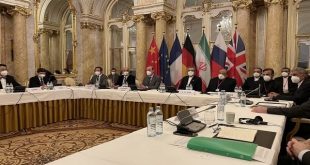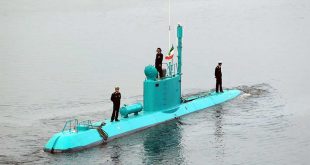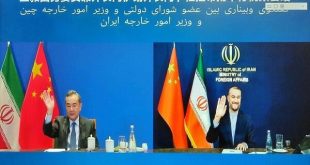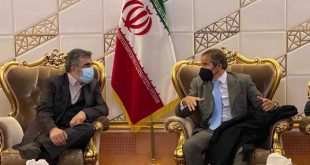“The US committed economic terrorism by stepping up economic sanctions against Iran even on medicine and food and violated all international regulations by assassinating Iran’s major commander, and Europe must respond to these US terrorist acts,” Rouhani said during the conversation on Thursday.
“The European Union is a major power in the world with a heavy responsibility and if it wants to contribute to regional peace and stability, Tehran is ready to cooperate with it”.
During the phone call that was initiated by Michel, President Rouhani said, “Iran is ready to cooperate more closely with the European Union and we believe that the opportunity for cooperation should not be lost.”
Referring to the condolences of the President of the European Council over the recent incidents, he said, “Mass demonstrations from Kashmir to Iraq and Lebanon following the assassination of Lieutenant General Qasem Soleimani show the martyr’s great popularity and role in the stability and security of the region.”
“Iran and Europe want stability in the region and strengthening of the JCPOA, and it is very important for us that Europe, China, and Russia play their important role in preserving the JCPOA in order to secure Iran’s interests,” he added.
Rouhani described Iran’s five steps in reducing its JCPOA commitment as restoring balance, stating, “Iran will continue to cooperate with the IAEA”.
During the phone call, President of the European Council expressed his condolences over recent incidents in Iran, saying, “The JCPOA was the result of a 10-year negotiation and the EU will do its best to save the agreement”.
“Europe is making every effort to play a positive role in global and regional political dynamics, and has repeatedly called on the United States in recent days to avoid further escalation of tensions in the region,” said Michel.
“We are concerned about developments in the region and invite all parties to exercise restraint,” he added.
The President of the European Council also praised Iran’s cooperation with the International Atomic Energy Agency in spite of the suspension of its obligations.
Lieutenant General Soleimani was martyred in a targeted assassination attack by the US drones at Baghdad International Airport early on Friday morning.
The airstrike also martyred Abu Mahdi al-Muhandis, deputy commander of Iraq’s Popular Mobilization Forces (PMF), or Hashad al-Shaabi. The two were martyred in an American airstrike that targeted their vehicle on the road to the airport.
Five Iranian and five Iraqi militaries were martyred by missiles fired by the US drone at Baghdad International Airport.
The attack came amid tensions that started by the US attack on PMF units that killed 28 Iraqi popular forces. A day later, Iraqi people attacked the US embassy in Baghdad.
The targeted assassination attack represents a dramatic escalation by the US toward Iran after months of tensions. The tensions take root in Trump’s decision in May 2018 to withdraw the US from Iran’s nuclear deal with world powers, struck under his predecessor.
On Wednesday, the IRGC Aerospace Force launched heavy ballistic missile attacks on US Ein Al-Assad airbase in Southwestern Iraq near the border with Syria and a US operated airbase in Erbil in retaliation for the assassination of General Soleimani.
Ein Al-Assad is an airbase with a 4km runway at 188m altitude from sea levels, which is the main and the largest US airbase in Iraq. Early reports said the radar systems and missile defense shields in Ein Al-Assad had failed to operate and intercept the Iranian missiles. Unofficial reports said the US army’s central radar systems at Ein Al-Assad had been jammed by electronic warfare.
Some 80 US army personnel were killed and nearly 200 more wounded in Iran’s Wednesday missile attacks, informed sources said.
The second IRGC reprisal attack targeted a US military base near Erbil airport in Iraqi Kurdistan Region in the second leg of “Martyr Soleimani” reprisal operation.
All flights were cancelled at Erbil airport.
Iraq said the attacks had not taken any toll from its army men stationed at these two bases. The US army had blocked entrance into Ein Al-Assad to everyone, including the Iraqi army.
It was the first direct attack on the US army ever since WWII.
IRGC officials said none of the missiles had been intercepted.
Following the attack, the IRGC issued a statement immediately after the attacks, declaring that it had fired tens of ground-to-ground missiles at “the airbase occupied by the terrorist and aggressive army of the United States known as Ein Al-Assad” in reprisal for the martyrdom of IRGC Qods Force Commander Lieutenant General Qassem Soleimani.
The IRGC warned the US to avoid retaliating the Wednesday attack or else “it will face a more painful and crushing response”.
The IRGC Statement also warned “all the US allied states where the terrorist army has a base, any territory that becomes the origin of any hostile and aggressive action against the Islamic Republic of Iran in any way will be targeted”.
“We believe that the Zionist regime by no means stands aside from the criminal US regime in these crimes.”
The IRGC also called on the American nation to pressure the White House to pull their troops out of the region to avoid further damage and not allow the US rulers to endager the lives of their military men through increasing hatred.
All Iranian underground missile towns were on alert.
The missile attack came hours before the body of General Soleimani was laid to rest.
 WILAYAH NEWS VOICE OF THE GLOBAL AWAKENING
WILAYAH NEWS VOICE OF THE GLOBAL AWAKENING






